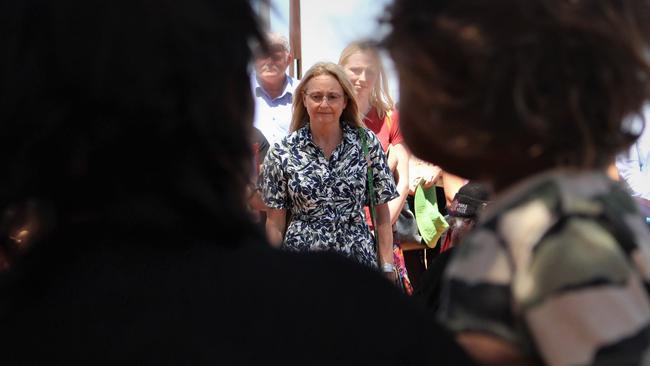‘Inaccurate’ report on Zach Rolfe’s ‘violent criminal history’ excluded from Kumanjayi Walker inquest
An expert academic report into Kumanjayi Walker’s death will not be considered when the inquest resumes. Read why the coroner found it was ‘inaccurate’.

Police & Courts
Don't miss out on the headlines from Police & Courts. Followed categories will be added to My News.
A finding that Kumanjayi Walker’s death was “the result of brutal, structural, racial violence perpetrated by the NT government” will not be considered at an inquest into the fatal police shooting.
Former NT Police constable Zach Rolfe was acquitted on all charges in the Supreme Court last year after he shot the 19-year-old Warlpiri-Luritja man three times during a bungled arrest in Yuendumu in November 2019.
Territory Coroner Elisabeth Armitage is now presiding over an ongoing inquest into Mr Walker’s death, with Mr Rolfe expected to take the stand in the Alice Springs Local Court in July.
In a decision handed down late last month, Ms Armitage ruled she would not allow a report tendered by the North Australian Aboriginal Justice Agency to be admitted into evidence at the inquiry, following objections from Mr Rolfe and others.
In September, counsel assisting the Coroner, Patrick Coleridge, read aloud from the expert academic report to put its findings to a police witness during his testimony “as a matter of fairness”.
“The report concludes: ‘Overall, we find that the death of Kumanjayi Walker was the result of brutal, structural, racial violence perpetrated by the NT government through its police and health agents’,” he said.
But last month Ms Armitage agreed with the objecting parties, including NT Police and the Health Department, that the report was “deficient as an item of expert evidence”.
“Although I do not doubt that the authors of the report possess relevant ‘expertise’, it is difficult to discern how the report’s conclusions are the product of it,” she said.
“Some of the ‘opinions’ – for example, opinions that conduct did or did not occur, or that it was or was not motivated by racial bias – appear to be lay inferences from the primary evidence.
“Other opinions – such as those criticising clinical decisions as ‘unreasonable’ – would seemingly require expertise that most of the authors do not have.”
Ms Armitage also found the report contained “significant factual inaccuracies which have formed the basis, or part of the basis, for its conclusions” and “evidence of prejudgement by some of the report’s authors”.
“The authors assert that Constable Rolfe has a ‘violent criminal history’, including a ‘criminal conviction for grievous bodily harm’, which exaggerates or misconstrues his criminal history of a fine for ‘public nuisance’,” she said.
“These inaccuracies are not insignificant and they undermine my confidence in the report’s conclusions.”
However Ms Armitage said she would accept one part of the report “which provides a general explanation of ‘key concepts’ such as institutional and systemic racism”.





